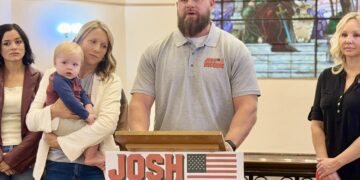By John F. DiLeo -
Reflections on the deceptive silence of local elections…
In November of every even year, American citizens go to the polls.
Those federal elections get press coverage, avalanches of campaign funds, public service ads encouraging participation, televised debates and perhaps best of all, partisan labels to simplify one’s choices.
The spring and fall elections of odd years like 2021 enjoy no such star power.
When we go to the polls this year – in Illinois, for example, the magic date is April 6 this year; the “early voting” period is already in full swing – we have none of those attention-grabbing tools to remind us to show up at all, let alone to help us know for whom to cast our votes.
But it is worth the research. It is worth the attention. It is worth the time.
The Ballot
In Illinois this week, for example, most jurisdictions will see an election for village or city officials like the mayor and the aldermen. We will see our local grammar school and high school boards of trustees on the ballot. We may see our township offices, our library board or our park board on the ballot as well.
These typically part-time positions, usually unpaid or very low-paid, are viewed more as a public service than higher offices.
A state legislator, congressman or senator gets a serious paycheck, a sizable office allowance and taxpayer-funded staff, and gets to make decisions on which we all have an opinion: things like building or expanding the interstate highways, whether to send troops to a trouble spot, whether to enforce the border, whether to curtail our already gigantic welfare state or expand it even further.
Not so with these local offices. Individual office holders get no press, minimal donations, no staff or office allowance. Most citizens have never heard of them. They must be generous public servants to be willing to run for such offices, mustn’t they?
And most of these posts are nonpartisan, leaving voters lost as to how to choose between them. We assume the issues are different, at the local level. Who is the conservative? Who is the liberal? What do these terms even mean at this level?
From the average voter’s perspective, it’s easiest to say, “Oh, it’s too much work to decide,” and skip the election entirely. It's easy to give in to the temptation to "let those who pay attention, those who know the issues and the players, make the decisions in these races."
But who does that leave to make the decisions?
An Insiders’ Game
Who knows the players? And who knows the issues?
Well, at the local level, the people who know the most about these boards are the employees: the people who work for these branches. The employees of the library know what decisions the library will make. The employees of the park district will know the park board’s decisions. The bureaucrats who work at city hall will best know what’s going on inside it. The teachers and administrators of the public schools know what’s going on there.
And how will they vote? The same way any employee in the private sector will always vote, if given the chance to set his employer’s policy: he’ll vote for whoever will increase his wages and benefits.
Now, at a private store or factory, such power, while still dangerous, would be limited. Even if the employees on the line could set their own benefits and salary, they would still be limited by the company’s sales. As unwise as such a conflict of interest may be, it would be self-regulating. They can’t pay themselves more than their sales allow.
But in the public sector, we don’t have that protection, do we?
In the public sector, if the board votes itself unaffordable wages and benefits, it can just raise taxes to cover them. Many of the candidates for these roles, in fact, campaign for the office specifically on the promise to raise taxes, or to support huge bond issues to pay for such expansion.
Because at the local level, it’s not just about raising an hourly wage, or increasing a pension benefit. That’s chicken feed at this level.
The real danger here is expansion. “We don’t have enough programs at our local – fill in the blank – library, park district, township or school.” “We need a new program to better serve our - fill in the blank – preschoolers, grammar schoolers, middle schoolers, high schoolers.” “We have such a large community, our north side or south side or east side or west side are underserved.” This is the rallying cry of the reformer, the decent, generous public servant who only wants to give a little of his time, and a lot of your money, to a new cause that will double or triple the size of whatever level of local government he or she is running to serve.
It’s an insiders’ game. These local government jobs may pay “only” ten or fifteen dollars an hour, so it doesn’t sound extreme, but doubling the programs means doubling the employment, doubling the salary and benefit cost. Nowhere else in either government or the private sector do we see the risk of uncontrolled, unaffordable mission creep and sheer cost acceleration that we do in some of these local boards.
Who Runs?
There is therefore, often – though certainly not always – a degree of cycling that goes on in these races. Part time coaches or program leaders in the park district, part time volunteers at the library, capitalize on their experience in the organization to run for a seat on the board.
This may be for the good; a volunteer who knows how successfully a volunteer program can be managed may well advocate for more low-cost volunteer participation.
Or it may be for the bad; a volunteer or part timer may have always thought the program was undervalued, and needs more funds and more full time staff to reach its potential.
Which type is running? Which ones on the ballot are the ones looking out for your wallet? That’s the hard part, especially when there’s no party label on the ballot to give you a clue.
Nowhere is this problem more severe than on our local school boards.
Typically (in Illinois at least, most likely almost everywhere), the school board approves a budget that is largely presented by a district superintendent and his staff, who are hired by the school board. The board negotiates labor contracts with the teachers’ union and other unionized employees (such as kitchen staff, bus drivers, and sometime even clerical help in AFSCME or other unions).
This employment contract negotiation must be an adversarial relationship. It simply has to be. But in too many districts, the teachers, superintendents and union bosses run for school board, and win, because voters are convinced that their perceived inside knowledge fully qualifies them. Such voters (and sadly, the newspapers that issue endorsements), fall for this con again and again, ensuring that the fox will always guard the chicken coop, if not universally, then at least by majority vote.
The Dangers
One of many odd things about these elections is that some of the risk is inversely proportional to expectations; the reality of what we confront is often counterintuitive.
At the state and national levels, there are usually certain protections against severe damage. The State and Federal Supreme Courts may reject some of the most unconstitutional regulations. There’s a new election every two years for part or all of the legislature, so horrible errors can be punished at the ballot box while they’re still fresh in the public mind, and/or reversed by the next legislative session. There is (or at least, used to be, and hopefully will be again) an adversarial and nonpartisan press that watches the behavior of these political bodies, and publicizes their errors in judgment or controversial positions.
Not so at the local level.
Most of us don’t even know what our towns and townships do, let alone know who runs them. Most of us don’t follow our school boards or our park districts, and we assume nothing they could do is controversial anyway. If only that were the case.
These local elections are the ones where each voter has the greatest possible impact on both the election results and the effects of the winners’ actions.
This is the election, more than any other, that determines your state income tax, your sales tax, and your property tax. How much these people decide to expand or contract the programs they administer will determine whether your community can be proud of low property taxes or buried by high ones.
And how much of an impact will your vote have? Well, in that national election last fall, your vote for president was one out of some 140 million. Your vote for Congress may have been one of a hundred thousand. By contrast, your vote this spring, for park board, school board or alderman, could easily be just one out of a few hundred, or a few thousand. Your effect on these races is astronomically greater, because of the local nature of the jurisdictions and the pitifully low turnout of these elections.
The pension crisis that’s killing the state of Illinois (and many others as well) has its origin in these local boards, due to mistakes made by the people that hold these offices. The outrageous operating expenses of many park districts and school districts are caused by being stuck with the unjustifiable overbuilding of a past board, decades ago, who made a mistake you don't want repeated. And the school and park boards are the home of a terrible social crisis in our schools and park districts, as confused children who are coached to “identify” as transgender are putting women’s sports and other women’s activities, in particular, on a fast track to oblivion, robbing millions of girls of the ability to qualify for scholarships and the other benefits of female sports.
It’s worth noting, too, that the board members who cause this destruction don’t always stop there. Local boards are a common source for candidates for higher office. Politicians often move up from these local boards to the state and federal legislature. Having served on a library or township board is viewed as a splendid qualification for a higher legislative role.
One of our very worst presidents, for example, started his career on a school board. Think of the trouble the world might have been spared if Jimmy Carter had lost his bid for the Plains, Georgia school board, perhaps causing him to give up on politics and dedicate himself more fully to his agricultural interests.
This election day, think of your property tax bill. Think of your state’s budget challenges. Think of your daughter’s hope for a winning season on the girls’ basketball team and the potential college scholarship that season might bring her.
And think of Jimmy Carter.
You can’t know, when you cast that ballot, whether you’ll be sharing responsibility for the next local bankruptcy, or the next disastrous national politician’s career.
But you can take it seriously, and have a much better shot at making the right decision, if you remind yourself of all there is at stake.
May Divine Providence guide our hands, this April 6 and on every election day.
Copyright 2021 John F Di Leo
John F Di Leo is a Chicagoland-based trade compliance and transportation manager, writer and performer. A former county chairman of the Milwaukee County Republican Party, he has been writing for Illinois Review since 2009.
A collection of John’s Illinois Review columns on vote fraud in America, “The Tales of Little Pavel,” is available from Amazon in either eBook or paperback.
Don’t miss an article! Use the free tool in the margin to sign up for Illinois Review’s free email notification service, so that you always know when Illinois Review publishes new content!








